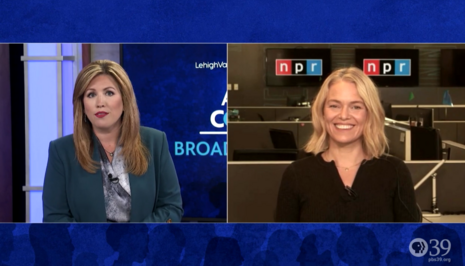The cuts to National Public Radio’s taxpayer funding have definitely been a long time coming. The leftist outlet is blaming climate change (there’s a surprise) for — wait for it — a lot of rain, in summertime!

“Climate change is fueling brutal rainstorms. Here's how to stay safe,” read the ridiculous headline for NPR’s July 15 Consider This podcast by All Things Considered co-host Juana Summers (ironic) and Climate Desk correspondent Michael Copley, both of whom are not scientists.
Of course, Summers exploited the Texas flood disasters as a springboard to blame rainfall and recent flooding writ large in the U.S. as being a byproduct of the left’s eternal boogeyman: climate change. “So why is climate change expected to make extreme rainstorms like the ones we've seen this month more common,” Summers teased. “To dig into that question and what people can do to prepare, I spoke with Michael Copley from NPR's climate desk.”
Copley then went for the typical climate activist drivel: blame the darn humans! “So people keep releasing a ton of greenhouse gas emissions, mainly from burning fossil fuels like coal and oil, and that's raising global temperatures and fueling more intense rainstorms that drop more water in shorter periods of time,” he spewed. What’s telling is that he said the quiet part out loud when he prefaced his statement by admitting,“So in general, a warmer atmosphere holds more moisture.” No kidding, Sherlock! But he insisted that “we're going to see more extreme weather events as the Earth keeps heating up, and that's going to pose bigger threats to people and their homes and cities.”
Climate Depot Founder Marc Morano blasted NPR's eco-fanaticism in comments to MRC Business. "Listening to or reading climate 'news' from NPR was a throwback experience to the days when the U.S. actually funded such tripe. Oh, wait! We still do," Morano rebuked. "But as of July 17, it looks like the days of U.S. taxpayers footing the bill for utter climate garbage are severely numbered."
Morano then tore apart NPR's arguments to shreds:
NPR rehashes all the same old scare tactics about extreme weather and, in particular, how 'climate change is fueling brutal rainstorms.' There is just one glaring problem with NPR's reporting. Even the United Nations' climate reports don't agree with the soon-to-be defunded network. On climate timescales, flooding and flash floods are not increasing globally, nationally, or locally in Texas, contrary to NPR claims.
Further, noted Morano, "the United Nations, the US federal National Climate Assessment, and peer-reviewed studies all show that extreme weather, ranging from hurricanes, tornadoes, wildfires, and droughts, is not increasing on climate timescales of 30, 50, or 100 years."
As CO2 Coalition Science and Research Associate Vijay Jayaraj wrote in an April 21 op-ed using monsoon-afflicted India as a case study for summer climate, “The average annual rainfall between 2000 and 2023 shows us that there is no crisis. The early 2000s experienced several significantly wet years, with 2003 recording nearly 49 inches of precipitation.” In addition, wrote Jayaraj, “From the mid-2000s to the early 2010s, there was a notable decline in rainfall, with 2009 being especially arid.”
What the data indicates is that there is “no discernible trend of increasing or decreasing precipitation throughout the period.” The overarching principle, Jayaraj concluded, was that “climate fluctuates” in summer. Did Summers or Copley consider that possibility? Probably not.
So what’s Copley’s solution to the climate problem? Ah yes, just throw an ungodly bunch of tax money at it: “[Columbia Business School climate economist Gernot] Wagner says communities need to invest billions and billions to deal with more extreme weather.”
Listen to NPR's entire 10-minute climate propaganda below.
What’s even more telling was how Copley managed to insert radio and television as being indispensable tools for issuing weather alerts, given that both NPR and its federally-funded counterpart PBS were on the verge of getting their tax funding stripped. “It's important to make sure that you're getting the emergency alerts. People get those through their cellphones, oftentimes. They're often - they're also broadcast over the radio and television,” he said. NPR CEO Katherine Maher went on the record June 12 kvetching over how if NPR’s funding is cut, “millions of Americans will no longer have access to locally owned, independent, nonprofit media and will bear the risk of living in a news desert, missing their emergency alerts, and hearing silence where classical, jazz and local artists currently play.” Talk about being overdramatic.
Leave it to NPR to capitalize on crises in order to protect its bottom line. A Media Research Center analysis concluded that “local news” is rare news on NPR. In fact, the bulk of NPR affiliate programming (ranging from 90-100%) aired across the country is supplied by the flagship stations in major markets like Boston, New York, Washington, DC, Philadelphia, San Francisco and Los Angeles. On the flip side, only an infinitesimal 5.4 percent of daily programming is dedicated to local news across all 50 states.
Funny how that works, isn’t it?
The United States Senate recently voted to approve President Donald Trump’s recissions package clawing $1.1 billion funding away from NPR and PBS through the Corporation for Public Broadcasting. The House of Representatives, in turn, later passed the package in a midnight vote and sending it to President Trump’s desk. At least Americans won’t have to worry about making any more tax contributions to the fanatical servants of Gaia at NPR for the time being. As Morano concluded, "What a great time to finally defund this crappy excuse for a news outlet." No kidding.
MRC Free Speech America Vice President Dan Schneider contributed to this report.





